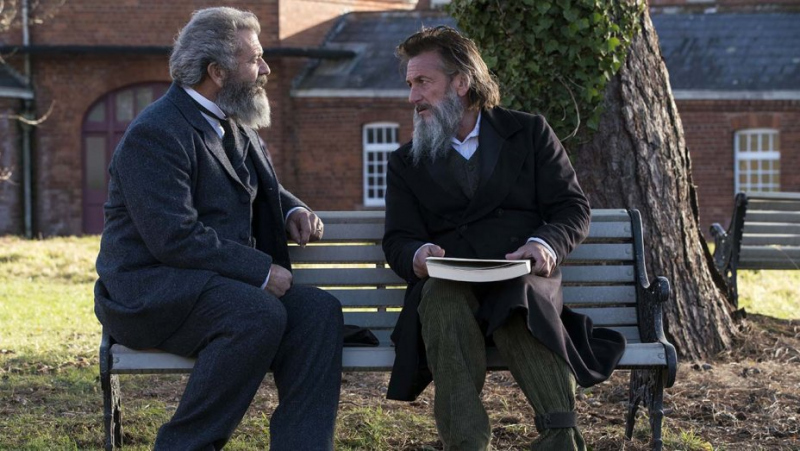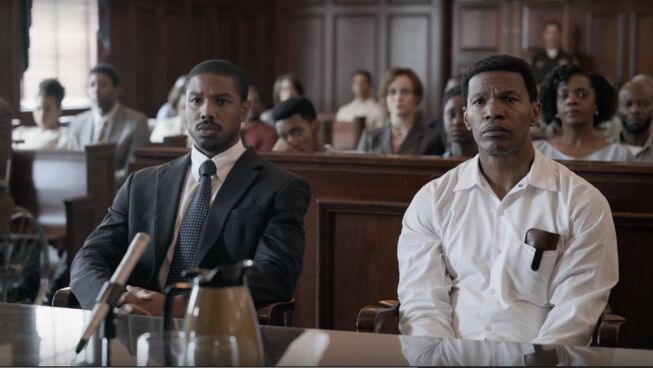
3 out of 5 stars
Throughout the ages, madness and insanity have taken on different characteristics and definitions. The intricacies of the human mind have baffled and fascinated scientists throughout history. Within the various levels of mental illness, it can be challenging to determine the line between a patients value to society and when they may become a harm to themselves or others. This is at the heart of Simon Winchester’s book, an investigative study into the case of Dr. William C. Minor (Sean Penn). A convicted murderer who was incarcerated at an asylum for the criminally insane, but despite his mental illness he went onto become an essential resource for the establishment of today’s English dictionary.
A task that had perplexed Oxford University's leadership for decades was now underway. It was when Professor James Murray (Mel Gibson) took over the plan of putting together Oxford’s English dictionary that it started to take shape. The process involved a method of getting input from common citizens from all over the world. As the information came in, Professor Murray and his team began to piece together the history and definitions of the English language. A painstaking process that came at great sacrifice to the families and reputations of the men behind this project. Each word took a multitude of man-hours to establish the details that made it worthy of being in the reference book. This slow technique began to be criticised by the leadership of the university and Murray started to lose confidence in achieving his dream, until he received a package from William Minor.
Dr. Minor was being held in Broadmoor Criminal Lunatic Asylum, due to his actions in murdering a man named George Merrett. An act that was later attributed to his issues with schizophrenia. While in prison, the American surgeon was given a book that had the request from Murray’s team for definitions and histories of English words. As part of his rehabilitation and treatment, the doctor used his vast knowledge and studies to send in over 10,000 entries for the dictionary. Over that time, the doctor and Professor Murray began to form a friendship that provided therapeutic benefit to both men, while moving the work on the dictionary project ahead at lightning speed.
The American’s involvement and medical treatment led to more than one complication for the team at Oxford and for the British legal authorities. William Minor’s reputation had spread nation-wide during his trial and to have him part of anything would cause the project to be considered questionable. Then to have the doctor reach out to George Merrett’s widow as a means of repentance lead the authorities at the asylum to discuss how to best treat their gifted and mentally unstable resident.
To think that there would be enough drama associated with the creation of the first English dictionary for a feature-length film seems to be the rantings of a madman. Yet, director Farhad Safinia (Apocalypto) manages to unearth enough tension and humour from Simon Winchester’s book to make a fascinating character study of these two men. Mel Gibson and Sean Penn pour themselves into their roles and give both characters the gravitas needed for audiences to grasp both of these men’s challenges and triumphs in life. These performances provide us with the heart of two passionate and brilliant men who manage to find themselves in exceptionally different lives, but how words brought them together. Natalie Dormer, Eddie Marsan, Jennifer Ehle, Stephen Dillane, and Steve Coogan provide an outstanding supporting cast that helps to show the humanity within this story of words.
 This story proves that there is something worth telling in even the most mundane and laborious of life’s tasks. A thinking person’s film that could have been even better with a bit more character development of Professor Murray’s family and fewer depictions of Doctor Minor’s treatment.
This story proves that there is something worth telling in even the most mundane and laborious of life’s tasks. A thinking person’s film that could have been even better with a bit more character development of Professor Murray’s family and fewer depictions of Doctor Minor’s treatment.
The only way to prepare yourself for an experience like The Professor and the Madman is to know that this is a tale of inner turmoil and unbridled drive. Two elements that are countered with graphic depictions of mental illness and subtle displays of grace and mercy. Audiences should come in with the knowledge that this story will creep up on you during the screening and then fester in your mind for some time afterwards.
REEL DIALOGUE: Why is there such a stigma with mental health?
Even with modern advancements and education, people still have a hard time knowing how to respond to the topic of mental illness. It is not new to society, throughout the Bible there are references to individuals that struggle with these internal challenges. The realities portrayed in the Bible help to show that the answers can be found in the words of Jesus. God can help through the journey and know that it is better to seek help than to struggle alone.
Passages on mental illnesses: Psalm 34:17-20, Matthew 17:14-20, Philippians 4:6-7, 2 Timothy 1:7
Who to contact if you need help? Beyond Blue or Wesley Mission






